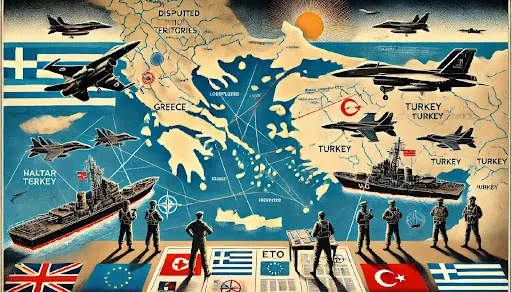Who Would Win in a War Between Greece and Turkey? A Comprehensive Analysis
Who Would Win in a War Between Greece and Turkey? A Comprehensive Analysis
The possibility of a military conflict between Greece and Turkey has been a topic of speculation for decades, given their long-standing historical tensions, territorial disputes in the Aegean Sea, and competing claims over Cyprus. While both nations are NATO members, their rivalry remains a significant geopolitical concern. If such a conflict were to occur, who would emerge victorious, and why? Let’s break it down.
Military Strength: A Comparative Overview
1. Turkey’s Military Advantages:
- Size and Manpower: Turkey has a larger population (over 85 million) compared to Greece (around 10.7 million), giving it a significant advantage in terms of manpower and conscription potential.
- Defense Budget: Turkey spends significantly more on its military, with a defense budget of approximately $20 billion (2023 estimates), compared to Greece’s $8 billion.
- Technological Edge: Turkey has invested heavily in domestic defense industries, producing advanced drones (like the Bayraktar TB2), warships, and missile systems. Its drone technology has proven effective in conflicts like Syria, Libya, and Nagorno-Karabakh.
- Geopolitical Position: Turkey controls the strategically vital Bosporus Strait and has a larger, more diversified military presence across land, sea, and air.
2. Greece’s Military Advantages:
- Geographical Advantage: Greece’s archipelago of islands in the Aegean Sea provides natural defensive positions and control over key maritime routes.
- Modernized Forces: Greece has invested in modernizing its military, including advanced fighter jets (like the Rafale and F-16s) and naval vessels.
- Alliances: Greece has strong diplomatic ties with the European Union and the United States, which could provide political and logistical support in a conflict.
- Defensive Posture: Greece’s military strategy is primarily defensive, focusing on protecting its islands and territorial waters, which could make it harder for Turkey to achieve a quick victory.
Key Factors That Could Determine the Outcome
1. NATO Involvement:
Both Greece and Turkey are NATO members, which complicates the scenario. NATO’s Article 5 (collective defense) might not apply if one member attacks another, but the alliance would likely intervene diplomatically to prevent escalation. External pressure from NATO and the EU could play a decisive role in de-escalating or limiting the conflict.
2. International Alliances:
Greece’s strong ties with the EU and the US could provide it with critical support, including intelligence, weapons, and economic aid. Turkey, on the other hand, has strained relations with some Western powers but maintains strategic partnerships with countries like Russia and Azerbaijan.
3. Economic Resilience:
A prolonged conflict would strain both economies, but Turkey’s larger economy and domestic defense industry might give it more resilience. Greece, while smaller, could rely on EU support to mitigate economic fallout.
4. Public Morale and National Unity:
Both nations have strong nationalistic sentiments, but public opinion and morale could play a significant role in sustaining a war effort. Greece’s smaller population might struggle with prolonged mobilization compared to Turkey.
Potential Scenarios
1. Short-Term Conflict:
If the conflict is limited to a skirmish over disputed islands or maritime boundaries, Greece’s defensive capabilities and geographical advantages might allow it to hold its ground. However, Turkey’s superior firepower and drone technology could give it an edge in a quick, decisive engagement.
2. Prolonged War:
In a drawn-out conflict, Turkey’s larger population, industrial base, and strategic depth would likely give it the upper hand. Greece, while resilient, might struggle to sustain a long-term war without significant external support.
3. International Intervention:
The involvement of NATO, the EU, or other global powers could shift the balance. If Greece receives substantial military aid from its allies, it could level the playing field. Conversely, if Turkey secures support from non-Western powers, it could strengthen its position.
Who Would Win?
While Turkey holds significant advantages in terms of military size, technology, and economic capacity, Greece’s defensive posture, geographical advantages, and strong international alliances make it a formidable opponent. The outcome would likely depend on the scale of the conflict, the level of international involvement, and the ability of each nation to sustain a prolonged war.
Ultimately, a full-scale war between Greece and Turkey would be devastating for both nations and the broader region. Diplomatic solutions and de-escalation remain the best path forward to prevent such a scenario.
What are your thoughts? Share your opinions in the comments below, and don’t forget to subscribe to my blog for more geopolitical analyses!



Comments
Post a Comment
Thanks for messaging Aradhya Study Point.
We will reply as soon as possible.